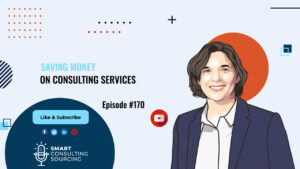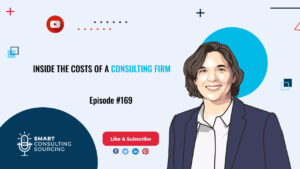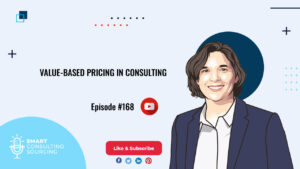Hi everyone, and welcome back to Smart Consulting Sourcing, the only podcast about consulting procurement.
I’m Helene, and today I will tell you how to use the six levers to get on board the transformation journey.
But before we get started, let me briefly recap what we discussed in our last 6-Lever series episode.
Organizations must ensure they stay ahead of the transformation curve if they want to be successful. This requires an all-hands approach, where top management is aligned with a shared vision, and stakeholders from across functions collaborate.
According to John Kotter’s 8 steps for effective change, building urgency around communication makes this process smoother; similarly, David Nadler encourages learning from past mistakes to maximize ROI for consulting spend going forward.
Opening up channels of dialogue allows outlining who needs what information when, as well as reducing potential resistance that could arise due to cultural or technical differences – ultimately leading towards improved adoption rates & collective celebration successes!
If you missed this episode – have no fear! You can find the podcast on Spotify, iTunes, and other podcast platforms. You can also watch it on YouTube on our channel. And, for those who prefer reading to listening, head to our website, consultingquest.com, where you will find the transcripts of every juicy detail in our thought leadership section!
And now, let us jump right into today’s topic.
Today, I’ll explore when to use consulting services from the perspective of end users: strategy leaders, operations leaders, and marketing leaders, and what procurement should know.
Let’s get started with today’s topic, then! We are going to talk about why and when executives need consulting services. First of all, for all my procurement listeners, let me remind you that you must understand the why and when of executive needs for consulting services. It will help you to anticipate their needs and be more proactive in your sourcing decisions.
Now that’s established, let me examine the question, when do executives typically work with consultants?
∙ It is extremely useful when embarking on a new course of action to have an independent party examine the choices and validate the approach
∙ Enter a new market: When they want to expand into new industries and new territories.
∙ Grow and Expand: When revenues stagnate, or a more powerful competitor threatens your market share, sales, and profitability.
∙ Merger or Acquire: When a company wants to acquire a competitor or a technology
∙ Improve product quality: When they want to break down their process into specific stages and identify potential product improvements.
∙ Reduce Costs: When they want to reduce costs and boost revenue and profitability by applying Lean Management, Lean Thinking, and Lean Processes.
∙ Develop organization and retain talents: When they want to design and implement a new organization & motivate and inspire their talents.
∙ Leadership Change: When they need to transition from one leadership team to the next seamlessly.
That’s a great list. Let me dig in further:
Executives work with consultants to identify and implement new strategies for growth; when a company wants to acquire or merge; when they want to improve product quality; reduce costs, develop the organization, and retain talents; and during leadership changes.
However, in many of these cases, there are usually some warning signs that procurement can identify and plan for. When you hear about such a project, your first step is to look at your panel of suppliers and your internal consulting group, if you have one, and determine if the project can be handled in-house or with your usual suppliers. If not, maybe that’s the right time to go and hunt some new suppliers with relevant expertise.
Finally, remember that you must be flexible and open-minded in this process – as the consulting world is constantly evolving, and new players are popping up daily. Don’t forget to check the latest market trends and use digital tools to source new suppliers.
Now let me come to the following question: how do consultants help their clients?
Let me give you an overview.
∙ Technical expertise: Consultants have specialized knowledge in a particular industry or function. They can provide data-driven insights to help you make better decisions and accelerate problem-solving.
∙ Independent perspective: Consultants provide an objective and independent view of the project. They will not be biased by previous decisions taken, which can be a huge advantage when taking a fresh look at the problem.
∙ Problem-solving approach: Consultants can help identify an issue’s root causes, develop creative solutions, and recommend implementation plans.
∙ Analytical skills: Consultants have a strong analytical mindset and can bring an evidence-based approach to the problem. They can provide data analysis, market research, and financial modeling to support decision-making.
∙ Temporary Extra workforce: Consultants can provide additional resources to the team without onboarding new employees. This flexibility is especially helpful when dealing with unexpected workloads or tight deadlines.
∙ Coaching: Consultants can provide guidance and advice to teams and mentorship for individuals. They will help to develop skills, build capacity and foster an innovative culture.
So, these were all essential points to consider when engaging a consultant. Now, what else should procurement know?
I mentioned before that procurement should anticipate the needs of their clients and look for new suppliers in the market. But you should be aware that several things can impact the need and, therefore, the capabilities required.
The maturity of the functions and the team’s composition will determine when and how executives work with consultants. For instance, a strategy team of former consultants will probably work with consultants on bits and pieces of the strategy cycle. Bringing in consultants when they need specific expertise and leading the whole process themselves. In other companies, the strategy group is a stepping stone for high-potential individuals from all parts of the company. They may not have formal training in strategy and need external help every step of the way.
The visibility of a given project can impact what type of consultants will be needed. If the project carries a high profile, you may need to bring in an outside group that is seen as more credible and prestigious. On the other hand, if it’s a lower visibility project, smaller niche firms may be more suitable.
Consulting is about trust and credibility. Never underestimate the relationship between the project sponsor and the partners. Your internal stakeholders may have consulting firms they are used to working with or even individuals they trust. And they follow them from one consulting firm to the next. An emotional component of trust and credibility goes along with these relationships.
Sometimes the need goes beyond the company’s interest. Some Executives rely on consultants to increase their influence and manage their careers. In these cases, the consultant’s role is more about coaching and mentoring.
So, we have covered pretty much all the main points. But in the end, I will add that it’s important to remember that not all consultants are created equal.
∙ Consulting services are not commodities: As with any industry, there can be a wide range of quality and prices in the market. Find the right balance between value for money and technical capabilities.
∙ Looking for impact: Remember that the ultimate goal of consulting should be to create a positive change: improved efficiency, better decision-making, increased engagement, and more.
And this can be a piece of great advice for leaders looking to implement a successful consulting project! Now let’s wrap up and summarize what we said today.
Executives typically work with consultants when they want to enter a new market, grow and expand, merge or acquire, improve product quality, reduce costs, develop the organization and retain talents, and during leadership changes.
With their technical savvy, third-party point of view, analytical capabilities, and more, consultants supply clients with the resources necessary to make well-informed decisions swiftly. Through problem-solving techniques and temporary reinforcements in workforce and coaching services, companies can benefit from a consultant’s valuable assistance as they traverse complex challenges.
Procurement should anticipate executive needs for consulting services by looking at their panel of suppliers and internal consulting groups. They should also be flexible in sourcing new suppliers with relevant expertise while keeping up with the latest market trends.
The need for a consultant can be affected by the maturity of an organization’s functions and team composition, as well as how visible the project is. This will dictate what type and size of consultancy is required and any existing emotional connections between stakeholders or partners before engaging with them.
Executives may need to rely on external consultants for many reasons, such as to increase their influence and manage their careers. This requires more mentor-coach roles than traditional consultancy services can provide.
Ultimately, it’s essential to strike the right balance between value and quality when selecting a consultancy. Leaders must make sure they choose an option that offers technical proficiency and the best financial value; achieving positive outcomes should be the end goal for all stakeholders.
Keep an eye up for me next week when I return with the next week with another exciting topic.
Until then, stay safe and happy sourcing. If you have any questions regarding today’s or any consulting procurement-related topic, don’t hesitate to get in touch with me directly on LinkedIn or by email because I’m always game for a chat.
Bye and see you next week, au revoir.
Stay connected with us through our community on LinkedIn and follow our Twitter handle @ConsQuest.
Don’t forget to like and subscribe to our channels!
Podbean
YouTube
Happy Sourcing!







